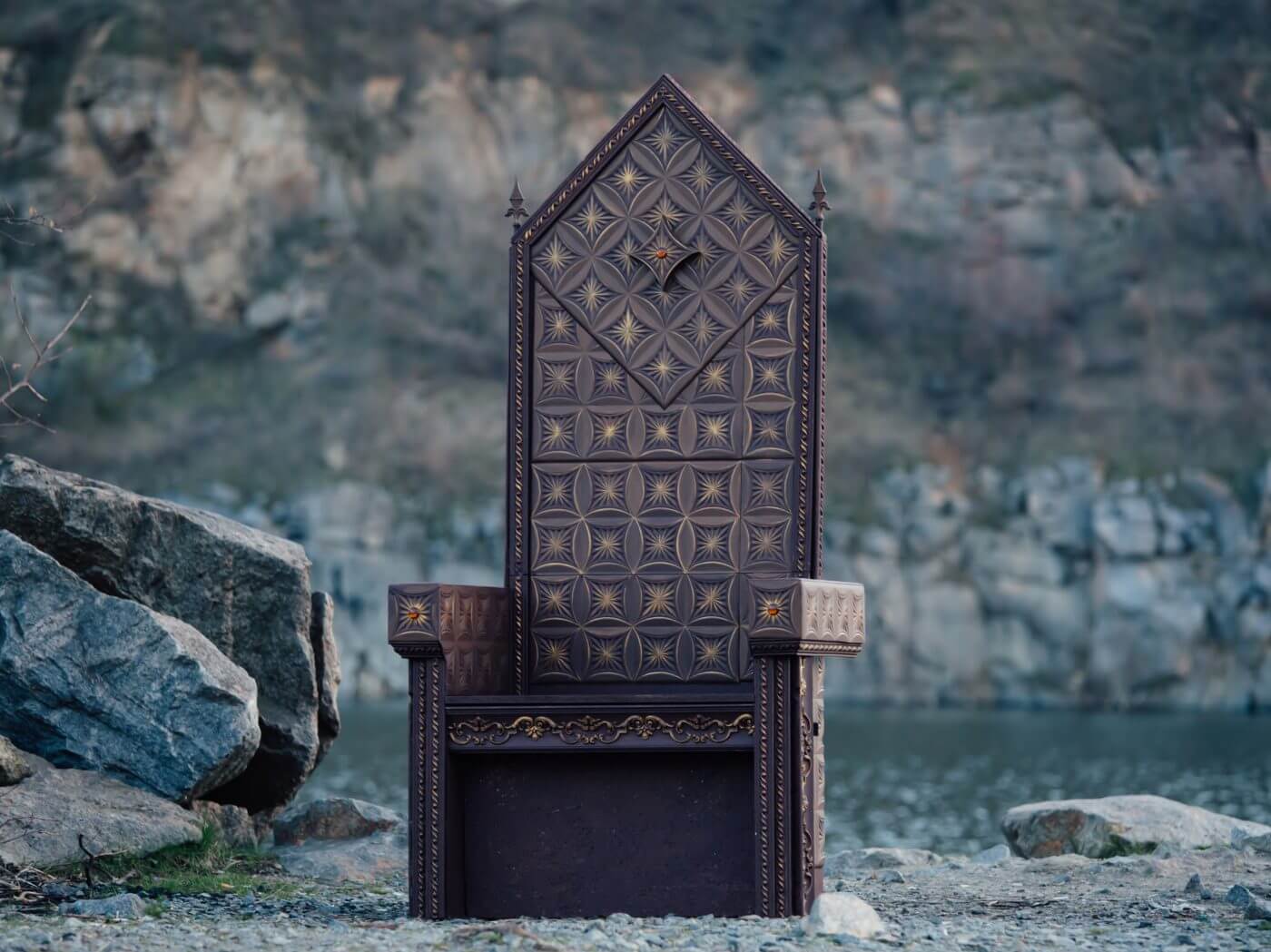
The Hike
Throne
2 Samuel 7:1–16

Israel’s first king, Saul, achieved great things, but he was not godly. What he achieved did not last. God raised up David, an unknown shepherd, to succeed him. When David defeated Goliath, everyone knew who he was. Saul was jealous of David, and he spent the last years of his life trying to destroy the future. But God’s hand was on David, and when Saul died, the way was open to crown the king with a heart for God.
There was immediate resistance to the new king. Some of Saul’s loyalists fought to defend their turf, but during the next two years the house of David grew stronger while the house of Saul grew weaker (2 Samuel 3:1) until eventually everyone accepted David as king (5:1–5).
Under David’s leadership God’s people captured Jerusalem, and when the city was taken, David built his palace and established his center of government there. Then David brought the Ark of the Covenant, the place where God met with His people, to Jerusalem. The presence of God was at the center of national life.
The nation was united, God’s people prospered, and there was peace. David had been more successful than he had ever dreamed, and he felt that it was time to give something back. David was a godly man with a good heart and a great idea.
A King’s Plan to Honor God
David didn’t feel right about living in a lavish palace while the ark of God was housed in a tent. He had it in mind to build a temple for God, so he called his friend Nathan, who said, “Go, do all that is in your heart, for the LORD is with you” (7:3). But that night God revealed to Nathan that, rather than David building a house for God, God would be the one to build a house for David.
Have you ever been in a situation when you wanted to do something good and God closed the door? You pursued some initiative, but it didn’t work out. Or you had a great idea, and someone else ran with it. When God closes the door, you will face the ultimate test of humility.
C. S. Lewis described humility as “a state of mind in which [a person] could design the best cathedral in the world, and know it to be the best, and rejoice in the fact, without being any more (or less) or otherwise glad at having done it than he would have been if it had been done by another.”1 True humility means you are more concerned that God is glorified and less concerned about whose name gets on it.
To David’s credit, he learned humility. It would not have been surprising if David had lost interest in the temple after God told him that he would not be the one to build it. But David’s humility is shown by the fact that he drew up the plans, gathered the materials, and then trusted the task of building the temple to his son (1 Chronicles 28:11–20).
Disappointment and the Door of Promise
When David faced the disappointment of a closed door, God gave him a wonderful promise: “The LORD will make you a house” (2 Samuel 7:11). Then God explained that He was not talking about putting up brick and mortar. He was making a promise about one of David’s descendants: “When your days are fulfilled and you lie down with your fathers”—that is, when you are dead—“I will raise up your offspring after you, who shall come from your body, and I will establish his kingdom” (7:12).
God promised that He would raise up a descendant of David. And of this offspring God said, “He shall build a house for my name, and I will establish the throne of his kingdom forever. I will be to him a father, and he shall be to me a son” (7:13–14).
Which son of David would fulfill these promises? How could any king’s reign last forever? How could a son of David possibly be the Son of God?
A Promise Deferred
God allowed Solomon to fulfill David’s dream of building the temple. And when it was dedicated, the cloud of God’s glory came down, filling the building with His presence. But a few years later Solomon died, and within a few hundred years Solomon’s temple was destroyed.
From the time of David onward, the Bible story revolves around the search for a son of David who would build a temple, whose throne would last forever, and who would be the Son of God. The first verse of the New Testament introduces us to Jesus as this promised son: “The book of the genealogy of Jesus Christ, the son of David” (Matthew 1:1).
Luke records the angel’s announcement to Mary that God’s promise would be fulfilled: “You will conceive in your womb and bear a son, and you shall call his name Jesus… And the Lord God will give to him the throne of his father David” (Luke 1:31–32).
When Jesus began His ministry and people saw His miracles, they were so astonished that they said, “Can this be the Son of David?” (Matthew 12:23). And when, three years later, He entered Jerusalem, they were waving palm branches and shouting, “Hosanna to the Son of David!” (Matthew 21:9).
The Throne That Will Last Forever
When the angel Gabriel announced the birth of Jesus, he said, “The Lord God will give to him the throne of his father David, and he will reign over the house of Jacob forever, and of his kingdom there will be no end” (Luke 1:32–33). But how can any kingdom last forever?
Jesus rose from the dead and He ascended into heaven. Death no longer has power over Him. As King of kings, Jesus is seated at the right hand of the Father, where “he must reign until he has put all his enemies under his feet” (1 Corinthians 15:25).
Jesus Christ will reign for ever and ever (Revelation 11:15). And He has promised that His disciples will share in His reign. “The one who conquers,” Jesus said, “I will grant him to sit with me on my throne, as I also conquered and sat down with my Father on his throne” (Revelation 3:21).
God had promised that a son of David would build a temple and reign forever, and we have seen how Jesus identified Himself with these great promises. But the most remarkable part of God’s promise was that God Himself would be a Father to David’s son. How could any son of David be described as the Son of God? God’s promise that David’s son would be His own son points us to the greatest miracle in the Bible.
Jesus Christ, the Son of God
Jesus was born to Mary, who was engaged to Joseph, a descendant of David (Matthew 1:16). But Jesus was not born as a result of intercourse between Mary and Joseph (1:25). He was conceived in the womb of the virgin by a creative miracle of God: “The Holy Spirit will come upon you, and the power of the Most High will overshadow you; therefore the child to be born will be called holy—the Son of God” (Luke 1:35). Jesus, the son of David, is the Son of God!
When we think of a son, we usually think of someone who is born twenty or thirty years after his father. But when the Bible tells us that Jesus is the Son of God, it is telling us that He shares the nature of His Father, and it is the nature of God to have no beginning. There never was a time when the Son of God was not with the Father: “In the beginning was the Word, and the Word was with God, and the Word was God” (John 1:1).
How God became a man in Jesus is a mystery, and yet once this truth is grasped, it begins to make sense of everything else. God became man. The eternal Son took flesh. The One who has always been beside the Father became a son of David bringing God and man together.
Children of God
When you come to faith in Jesus, the Son of God, the Father will adopt you into His family: “To all who did receive him, who believed in his name, he gave the right to become children of God” (John 1:12).
If you are struggling with self-worth and significance, let the truth of who Christ is and what He does for His people sink into the core of your being. Jesus is the Son of God. Faith joins you to Jesus, and through Him you are adopted into the family of God. Your body is now a temple of the Holy Spirit, who lives in you. You are a son or daughter of God, and your destiny is to enjoy Him forever. Take that into your most ordinary day or into your darkest hour. See the honor that God has bestowed upon you and let this lift you up.
Opened
God’s people can be confident about the future because Jesus Christ is on the throne. Through Him we are reconciled to the Father and become members of His family. Christ has many enemies, but they will all be put under His feet (Psalm 110:1). And the destiny of God’s people is to enjoy the blessing of His reign and rule forever.
Note:
1 C. S. Lewis, The Screwtape Letters (New York: Macmillan, 1942), 73.
2 Samuel 7:1–16
The Lord’s Covenant with David
1 Now when the king lived in his house and the LORD had given him rest from all his surrounding enemies, 2 the king said to Nathan the prophet, “See now, I dwell in a house of cedar, but the ark of God dwells in a tent.” 3 And Nathan said to the king, “Go, do all that is in your heart, for the LORD is with you.”
4 But that same night the word of the LORD came to Nathan, 5 “Go and tell my servant David, ‘Thus says the LORD: Would you build me a house to dwell in? 6 I have not lived in a house since the day I brought up the people of Israel from Egypt to this day, but I have been moving about in a tent for my dwelling. 7 In all places where I have moved with all the people of Israel, did I speak a word with any of the judges of Israel, whom I commanded to shepherd my people Israel, saying, “Why have you not built me a house of cedar?”’ 8 Now, therefore, thus you shall say to my servant David, ‘Thus says the LORD of hosts, I took you from the pasture, from following the sheep, that you should be prince over my people Israel. 9 And I have been with you wherever you went and have cut off all your enemies from before you. And I will make for you a great name, like the name of the great ones of the earth. 10 And I will appoint a place for my people Israel and will plant them, so that they may dwell in their own place and be disturbed no more. And violent men shall afflict them no more, as formerly, 11 from the time that I appointed judges over my people Israel. And I will give you rest from all your enemies. Moreover, the LORD declares to you that the LORD will make you a house. 12 When your days are fulfilled and you lie down with your fathers, I will raise up your offspring after you, who shall come from your body, and I will establish his kingdom. 13 He shall build a house for my name, and I will establish the throne of his kingdom forever. 14 I will be to him a father, and he shall be to me a son. When he commits iniquity, I will discipline him with the rod of men, with the stripes of the sons of men, 15 but my steadfast love will not depart from him, as I took it from Saul, whom I put away from before you. 16 And your house and your kingdom shall be made sure forever before me. Your throne shall be established forever.’”
(ESV)
Use these questions to further engage with God's Word. Discuss them with another person or use them as personal reflection questions.
Take the First Step to Open Your Bible
Join 35,000+ people who get ‘Open Today’. Every Wednesday you’ll get resources designed to inspire, encourage, and challenge you in opening your Bible.
Spend 31 days in Psalm 23 with this new book from Pastor Colin Smith for your gift of any amount in April!


